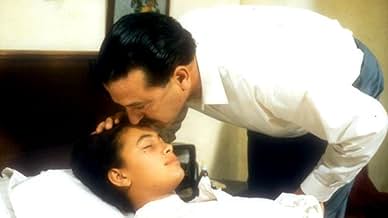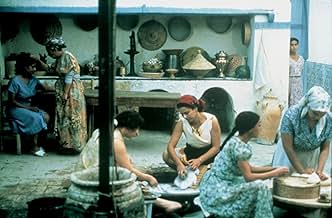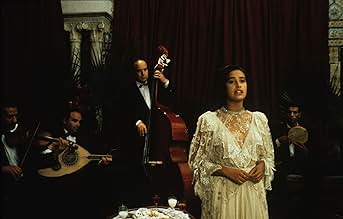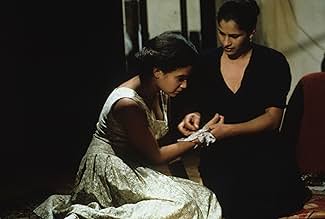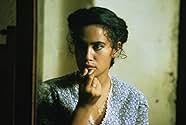Samt el qusur
- 1994
- 2h 7min
CALIFICACIÓN DE IMDb
7.3/10
1.2 k
TU CALIFICACIÓN
Agrega una trama en tu idiomaAs she grows up, Alia (the daughter of housemaid Khedija) learns the secrets of the peaceful palace where she and her mother live.As she grows up, Alia (the daughter of housemaid Khedija) learns the secrets of the peaceful palace where she and her mother live.As she grows up, Alia (the daughter of housemaid Khedija) learns the secrets of the peaceful palace where she and her mother live.
- Dirección
- Guionistas
- Elenco
- Premios
- 7 premios ganados y 1 nominación en total
Hind Sabri
- Alia
- (as Hend Sabri)
- …
Ghalya Lacroix
- Alia
- (as Ghalia Lacroix)
- …
Nejia Ouerghi
- Khalti Hadda
- (as Najia Ouerghi)
- Dirección
- Guionistas
- Todo el elenco y el equipo
- Producción, taquilla y más en IMDbPro
Opiniones destacadas
This film is a powerful story about economic and sexual oppression, and is equally interesting as a sort of history of underrepresented people during the French occupation as it is a comment on women's rights in Tunisia. I don't like what the commenter from Germany said- 'best film made in the Arab world wouldn't be a difficult superlative to obtain'? There are many great films that have been made in the Arab world, and whatever else you said about the film is worthless to me when you make that kind of statement because it tells me how many of the great Arab films you must have seen to judge it by- not many. I would agree, it is without doubt one of the best Arab films I've seen- but I would have to see literally thousands of Arab films before I could be comfortable making such an outrageous generalization.
Let us begin by discussing this film's title "The Silences of the Palace".This catchy title is an absolute misnomer as in real terms there are no silences in the palaces.Most of the palaces featured in the film are full of sounds but a feeling of silence is deliberately implied as there is no one willing to hear these sounds.Moufida Tlatli is an important name in the realm of both Arab as well as Tunisian cinema.She finished her cinema studies at famous French film institute IDHEC.Many famous Arab films bear her name as she did editing work for many prominent Arab film makers.Her debut film "The Silences of the Palace" is about the last days of Tunisian aristocracy.It was a time of confusion as Tunisian rulers were worried about their fate as the nation was looking forward to an imminent freedom.As portrayed in this film the plight of the common people including women has not changed as they are being continually forced to remain in silence.Moufida Tlatli dedicated this film to her mother who was a constant source of inspiration to her while she was drafting this film.If a list of best Arab films is drafted,this film by Moufida Tlatli will surely be there.
Set in 1950s Tunisia at the end of the French colonial rule, Moufida Tlatli's first directorial feature film encompasses a politically charged era through social dynamics, feminist vision and artistic choices, including - but not limited to - the first appearance of Hend Sabry, who went on to become one of the leading actresses of Tunisian and Arab cinema.
"The Silences of the Palace" tells the story of Alia, a nightclub singer visiting the bey's palace, where she grew up as the daughter of a servant. Upon her return, Alia embarks on reminiscing her adolescence and girlhood, uncovering the ghosts of her past and a murky family history.
"We were taught one rule in the palace: Silence", said one woman protagonist in the movie.
Clashes between Tunisian nationalist forces and the French forces are conveyed exclusively through radio reports, as we accompany the characters during curfews. Introducing well-developed female characters in a light and funny dialogue, the film also portrays their struggles in the monarch's palace and in the city at large. Ultimately, the "silence" here refers to the one covering sexual violence. However, the film offers hope subtly, in its enforcement of Arab women's voices in spaces where they were silenced.
This rebellious use of sound recalls the feminist movement's connection to music. The first wave of the feminist movement that occurred at the end of the 19th and early 20th centuries adapted soldier's songs for marches, borrowed tunes from popular songs and composed songs based on hymns, creating anthems about women suffrage. Whereas in the second wave (1960 - 1980), female bands created a specific genre within the punk rock genre, narrating the female experience and demands for justice.
Not only are the women of "The Silences of the Palace" singing labor songs in most of their scenes, but also the main character's voice defiantly sets the tone for the entire film. Through it, we are sent into a deep dive of musical heritage (put together by Anouar Brahem and Faouzi Thabet), whether Um Kalthoum's songs handpicked to feel like subtle messages to the beys, or the rebels' anthem that plays a key factor in the film's climax.
"The Silences of the Palace" could be defined as a coming-of-age story of a musician, whose act of singing was her coping mechanism under patriarchal and colonial rule; it was her tool of resistance, her means of communication with different social classes and her chaperone for more hopeful possibilities.
One cannot overlook the other cinematographic elements of the film. The cinematography and costume design offer general shots that act as art installations; we are told of entanglement through a scene of hands intertwining and told of mystery through a chase scene occurring in a traditional setting. The set designer's rich use of color and poignant classical details are visible in the halls, the bedrooms and the living rooms inhabited by the bey's family. Mirrors exhibit their duality, affairs and detachment. Lack of white in the space underlines the darkness behind luxury. Their materialism contrasts with the empty space occupied by the servants; an underground floor surrounded with white walls and fabric.
In remembrance of Moufida Tlatli, Hend Sabry wrote: ""Mova": the woman, the mother, the resonant voice, harboring a delicate emotion that tired her and made her create cinematic masterpieces at the same time... I miss you while you are alive, and I will miss a part of myself after your departure, and Arab cinema has missed one of its greats today."
"The Silences of the Palace" tells the story of Alia, a nightclub singer visiting the bey's palace, where she grew up as the daughter of a servant. Upon her return, Alia embarks on reminiscing her adolescence and girlhood, uncovering the ghosts of her past and a murky family history.
"We were taught one rule in the palace: Silence", said one woman protagonist in the movie.
Clashes between Tunisian nationalist forces and the French forces are conveyed exclusively through radio reports, as we accompany the characters during curfews. Introducing well-developed female characters in a light and funny dialogue, the film also portrays their struggles in the monarch's palace and in the city at large. Ultimately, the "silence" here refers to the one covering sexual violence. However, the film offers hope subtly, in its enforcement of Arab women's voices in spaces where they were silenced.
This rebellious use of sound recalls the feminist movement's connection to music. The first wave of the feminist movement that occurred at the end of the 19th and early 20th centuries adapted soldier's songs for marches, borrowed tunes from popular songs and composed songs based on hymns, creating anthems about women suffrage. Whereas in the second wave (1960 - 1980), female bands created a specific genre within the punk rock genre, narrating the female experience and demands for justice.
Not only are the women of "The Silences of the Palace" singing labor songs in most of their scenes, but also the main character's voice defiantly sets the tone for the entire film. Through it, we are sent into a deep dive of musical heritage (put together by Anouar Brahem and Faouzi Thabet), whether Um Kalthoum's songs handpicked to feel like subtle messages to the beys, or the rebels' anthem that plays a key factor in the film's climax.
"The Silences of the Palace" could be defined as a coming-of-age story of a musician, whose act of singing was her coping mechanism under patriarchal and colonial rule; it was her tool of resistance, her means of communication with different social classes and her chaperone for more hopeful possibilities.
One cannot overlook the other cinematographic elements of the film. The cinematography and costume design offer general shots that act as art installations; we are told of entanglement through a scene of hands intertwining and told of mystery through a chase scene occurring in a traditional setting. The set designer's rich use of color and poignant classical details are visible in the halls, the bedrooms and the living rooms inhabited by the bey's family. Mirrors exhibit their duality, affairs and detachment. Lack of white in the space underlines the darkness behind luxury. Their materialism contrasts with the empty space occupied by the servants; an underground floor surrounded with white walls and fabric.
In remembrance of Moufida Tlatli, Hend Sabry wrote: ""Mova": the woman, the mother, the resonant voice, harboring a delicate emotion that tired her and made her create cinematic masterpieces at the same time... I miss you while you are alive, and I will miss a part of myself after your departure, and Arab cinema has missed one of its greats today."
The best film ever made in the Arab World really isn't a superlative that would be difficult to attain, but this film is really a masterwork.
Aliya a singer with an superb voice but little success is invited to the palace where she spent her childhood as the daughter of a servant. She never really got to know who her father was, that she has been invited back to the palace after the head of the household, member of the Turkish ruling family of pre-independence Tunisia has died is no accident.
Back in the palace all her childhood memories come back to Alia. She remembers her mother being the concubine of the deceased. His wife was barren, and she becomes sure that she is his daughter.
She also remembers how her love for music helped her to gain prestige in the palace. But the songs she sang were not just entertainment. The melodies of Umm Kulthum were broadcasted by Radio Cairo to spread the message of Arab awakening and the longing for independence. Albeit its political aspects also the ruling family, a puppet on the strings of the French, enjoys the music. But for the masses the songs also become a symbol for the longing for freedom. falls in love with one student who is an independence activist. He is hiding in the palace where his aunt is another servant. He promises her a brilliant future but already at the beginning of the film we are told that the promise was not to be kept.
The film is a ingenious ridiculization of political rhetoric and seldom ever has Oriental music bee integrated in a film so brilliantly (except perhaps Ray's Jalsaghar). You will enjoy it even if Arab music doesn't mean anything to you.
Aliya a singer with an superb voice but little success is invited to the palace where she spent her childhood as the daughter of a servant. She never really got to know who her father was, that she has been invited back to the palace after the head of the household, member of the Turkish ruling family of pre-independence Tunisia has died is no accident.
Back in the palace all her childhood memories come back to Alia. She remembers her mother being the concubine of the deceased. His wife was barren, and she becomes sure that she is his daughter.
She also remembers how her love for music helped her to gain prestige in the palace. But the songs she sang were not just entertainment. The melodies of Umm Kulthum were broadcasted by Radio Cairo to spread the message of Arab awakening and the longing for independence. Albeit its political aspects also the ruling family, a puppet on the strings of the French, enjoys the music. But for the masses the songs also become a symbol for the longing for freedom. falls in love with one student who is an independence activist. He is hiding in the palace where his aunt is another servant. He promises her a brilliant future but already at the beginning of the film we are told that the promise was not to be kept.
The film is a ingenious ridiculization of political rhetoric and seldom ever has Oriental music bee integrated in a film so brilliantly (except perhaps Ray's Jalsaghar). You will enjoy it even if Arab music doesn't mean anything to you.
This film is a gateway to Tunisian culture as it was when the country became independent. The principal character is a young girl who lives in a palace, but she is not a princess. In fact, her mother is some kind of a slave who works there without beeing paid for it and having any chance to get out of the palace. She doesn't want to tell her daughter, who her father is. Outside, the country is aiming to get loose of the French power. This is a story about strong women who live and work together and take care of each other. They are not beautiful like the American or European film stars, but still somehow sexy and very feminine. They are afraid of their sexuality, because they cannot control the desire it awakes in the powerful men around them. Their only hope to get out of the palace is marriage, but very few men see them inside the walls of the palace. One could think that the movie is very pessimistic. In the contary, the love of the women and of music create an atmosphere of hope and the new generation has a possibility to choose...
¿Sabías que…?
- ConexionesFeatured in Women Make Film: A New Road Movie Through Cinema (2018)
Selecciones populares
Inicia sesión para calificar y agrega a la lista de videos para obtener recomendaciones personalizadas
- How long is The Silences of the Palace?Con tecnología de Alexa
Detalles
- Fecha de lanzamiento
- Países de origen
- Idiomas
- También se conoce como
- The Silences of the Palace
- Productoras
- Ver más créditos de la compañía en IMDbPro
Contribuir a esta página
Sugiere una edición o agrega el contenido que falta

Principales brechas de datos
By what name was Samt el qusur (1994) officially released in Canada in English?
Responda


